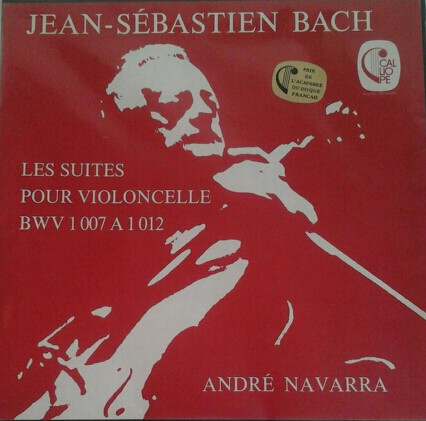
André Navarra. Bach Cello Suites. Caliope CAL1643AB. Remastered issue 2011.
Original release 1978 on LP. Recorded 1977&78.
The artist.
André Navarra to my mind ranks with Fournier, Gendron, and Tortelier as representing a group of virtuoso cellists from France. These cellists were to gain world wide recognition between the 60s and 80s. Contemporary interviews inform us that Navarra is a largely self taught cellist after the age of 15. In addition he did receive artistic mentorship from Casals. He was also a fitness enthusiast who considered the cello to require physical mastery for best results! It appears his bowing technique is widely respected and admired.
The recording.
The CD I used for this review states that it is a re mastering from original ½” tapes. There is little other information provided. The sound quality however, more than makes up for the lack of information in the booklet. We are given a lovely full bodied, smooth but detailed tone, with just the right amount of room acoustic. By this, I mean that during listening one is only aware of the cello, and not the room or studio in which it was recorded.
The interpretation.
This definitely falls in to the mainstream style of interpretation, with plenty of vibrato but very rapid, so it is not intrusive. Navarra has a reputation for outstanding lyricism in his playing and he brings this to the Suites in buckets, particularly the Preludes and Sarabandes. The bonus, is that he complements this with clearly articulated faster movements. Two examples are, firstly, the transition from the second Allemande to the Courante. His, is one of the slowest Allemandes but fastest Courantes. The Courante is very rhythmic and stylish, and is one of the stand out moments of the performance. The second is the first Bouree of the fourth Suite where he bows the semiquavers separately with surgical precision.
Many times whilst listening to this performance, I am struck by the total commitment that comes over. It feels as if Navarra approaches recording like a live performance with no holding back. Often recordings display some level of restraint perhaps in the quest to achieve faultless results. However, this performance does have the occasional “inaccuracy” but the payoff is an enthralling listen. For instance sublime moments such as the subtle ending of the fourth Sarabande. Furthermore, in the sixth Prelude bars 74 &75 which can be considered the climax of the movement. Here, Navarra not only dwells a little longer on the very high notes but imbues additional strength of tone.
Conclusion.
Its not unusual for commentators such as ourselves to remark on the focus of a performance. Is it about seeking what the composer was intending to convey, or is it wanting to project a personal interpretation of the dots on the page to an audience? In my mind there is no doubt that this recording falls into the latter. There is no judgment from me as to whether that is good or bad. However, I do feel the world of Bach Cello Suites is all the richer for this contribution from André Navarra!
Charles.